10 start with D start with D
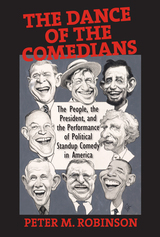
Peter M. Robinson shows how the performance of political humor developed as a celebration of democracy and an expression of political power, protest, and commercial profit. He places special significance on the middle half of the twentieth century, when presidents and comedians alike—from Calvin Coolidge to Ronald Reagan, from Will Rogers to Saturday Night Live's "Not Ready for Prime Time Players"—developed modern understandings of the power of laughter to affect popular opinion and political agendas, only to find the American audience increasingly willing and able to get in on the act. These years put the long-standing traditions of presidential deference profoundly in play as all three parties to American political humor—the people, the presidents, and the comedy professionals—negotiated their way between reverence for the office of the presidency and ridicule of its occupants.
Although the focus is on humor, The Dance of the Comedians illuminates the process by which Americans have come to recognize that the performance of political comedy has serious and profound consequences for those on all sides of the punch line.
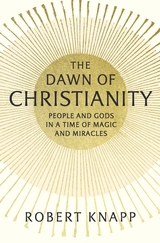
Ordinary people of antiquity interacted with the supernatural through a mosaic of beliefs and rituals. Exploring everyday life from 200 BCE to the end of the first century CE, Robert Knapp shows that Jews and polytheists lived with the gods in very similar ways. Traditional interactions provided stability even in times of crisis, while changing a relationship risked catastrophe for the individual, his family, and his community. However, people in both traditions did at times leave behind their long-honored rites to try something new. The Dawn of Christianity reveals why some people in Judea and then in the Roman and Greek worlds embraced a new approach to the forces and powers in their daily lives.
Knapp traces the emergence of Christianity from its stirrings in the eastern Mediterranean, where Jewish monotheism coexisted with polytheism and prayer mixed with magic. In a time receptive to prophetic messages and supernatural interventions, Jesus of Nazareth convinced people to change their beliefs by showing, through miracles, his direct connection to god-like power. The miracle of the Resurrection solidified Jesus’s supernatural credentials. After his death, followers continued to use miracles and magic to spread Jesus’s message of reward for the righteous in this life and immortality in the next.
Many Jews and polytheists strongly opposed the budding movement but despite major setbacks Christianity proved resilient and adaptable. It survived long enough to be saved by a second miracle, the conversion of Emperor Constantine. Hand in hand with empire, Christianity began its long march through history.
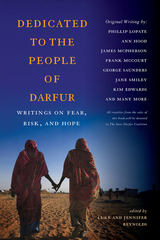
Nobel and Pulitzer Prize winners, a gallery of O.Henry award recipients, and many best-selling authors come together to share personal and compelling challenges and experiences. From contemplations on past drug use to reflections on gun control, social justice, passion and its sacrifices, and adventures such as skydiving, mountain climbing, and golfing, the topics vary greatly. This kaleidoscopic anthology is a commentary on the lives of prominent literary artists and ordinary citizens who have made simple, yet powerful choices that provoked change in one's self and for humanityùmuch the same way that Luke and Jennifer Reynolds do by building this invaluable collection for readers and the world of human rights.
Not too long ago, as struggling graduate students, Luke and Jennifer Reynolds conceived this uniquely themed volume as a way to raise funds to support ending the genocide in Darfur. Some people carry signs, others make speeches, many take action. What is most special about this book is that it extends beyond words and ideas, into a tangible effort to effect change. To this end, all royalties from the sales of Dedicated to the People of Darfur:Writings on Fear, Risk, and Hope will benefit The Save Darfur Coalition, an organization that seeks to end the genocide in Darfur, Sudan.
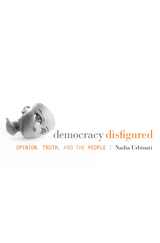
In Democracy Disfigured, Nadia Urbinati diagnoses the ills that beset the body politic in an age of hyper-partisanship and media monopolies and offers a spirited defense of the messy compromises and contentious outcomes that define democracy.
Urbinati identifies three types of democratic disfiguration: the unpolitical, the populist, and the plebiscitarian. Each undermines a crucial division that a well-functioning democracy must preserve: the wall separating the free forum of public opinion from the governmental institutions that enact the will of the people. Unpolitical democracy delegitimizes political opinion in favor of expertise. Populist democracy radically polarizes the public forum in which opinion is debated. And plebiscitary democracy overvalues the aesthetic and nonrational aspects of opinion. For Urbinati, democracy entails a permanent struggle to make visible the issues that citizens deem central to their lives. Opinion is thus a form of action as important as the mechanisms that organize votes and mobilize decisions.
Urbinati focuses less on the overt enemies of democracy than on those who pose as its friends: technocrats wedded to procedure, demagogues who make glib appeals to “the people,” and media operatives who, given their preference, would turn governance into a spectator sport and citizens into fans of opposing teams.

David Campbell recounts compelling stories of the workarounds, sidesteps, informal agreements, and grantor–grantee negotiations that help policy initiatives succeed as intended. The settings include schools, human services departments, workforce development agencies, and community-based organizations. He explains why it is difficult, though necessary, to translate locally attuned implementation dynamics into accountability metrics for distant funders.
Drawing on 2,000 interviews, Democracy’s Hidden Heroes is the culmination of decades spent talking to people who must reconcile bureaucratic and community cultures. Campbell’s grounded approach and balanced perspective bring fresh insights to the analysis of policy implementation, public management, and results accountability, while offering both cautionary advice and a hopeful prognosis.

With Democratic Swarms, Page duBois revisits the role of Greek comedy in ancient politics, considering how it has been overlooked as a political medium by modern theorists and critics. Moving beyond the popular readings of ancient Greece through the lens of tragedy, she calls for a revitalized look at Greek comedy. Rather than revisiting the sufferings of Oedipus and his family or tragedy’s relationship to questions of sovereignty, this book calls for comedy—its laughter, its free speech, its wild swarming animal choruses, and its rebellious women—to inform another model of democracy.
Ancient comedy has been underplayed in the study of Greek drama. Yet, with the irrepressible energy of the comic swarm, it provides a unique perspective on everyday life, gender and sexuality, and the utopian politics of the classical period of Athenian democracy. Using the concepts of swarm intelligence and nomadic theory, duBois augments tragic thought with the resistant, utopian, libidinous, and often joyous communal legacy of comedy, and she connects the lively anti-authoritarianism of the ancient comic chorus with the social justice movements of today.


The design of information literacy instruction and the building of it are two distinct skillsets and processes; yet all too often everything gets mashed together, creating needless confusion and stress. In this book Turnbow, an instructional designer, and Roth, an instructional technologist, suggest a better way to organize the work. They shed light on the people, processes, and resources required to create a sustainable portfolio of online instruction. With the goal of fostering conversations in your library about the most streamlined and effective ways to get the work done, they provide guidance on such topics as
- design and development processes, complete with “I.D. in Action” examples and sample design documents;
- thumbnail descriptions of ADDIE, SAM, and design thinking methods;
- creating learning objects;
- types of software tools and how to evaluate them;
- crafting the best documentation of your work for efficient maintenance and reuse;
- adapting assessment to your learning outcomes and purpose;
- when to design for performance support, an underutilized method in libraries; and
- starting points for those interested in developing instructional design and development skills.
Demystifying the instructional design and development process used to create online learning objects, this book will help you understand how instructional design principles and approaches can benefit your learners.

How are greenways designed? What situations lead to their genesis, and what examples best illustrate their potential for enhancing communities and the environment? Designing greenways is a key to protecting landscapes, allowing wildlife to move freely, and finding appropriate ways to bring people into nature. This book brings together examples from ecology, conservation biology, aquatic ecology, and recreation design to illustrate how greenways function and add value to ecosystems and human communities alike.
Encompassing everything from urban trail corridors to river floodplains to wilderness-like linkages, greenways preserve or improve the integrity of the landscape, not only by stemming the loss of natural features, but also by engendering new natural and social functions. From 19th-century parks and parkways to projects still on the drawing boards, Designing Greenways is a fascinating introduction to the possibilities-and pitfalls-involved in these ambitious projects. As towns and cities look to greenways as a new way of reconciling man and nature, designers and planners will look to Designing Greenways as an invaluable compendium of best practices.
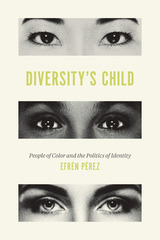
For decades now, pundits and political scientists have been pointing to a major demographic change that’s underway in the United States. Demographers project that whites will become a minority of the US population and that minority groups will jointly comprise a majority before 2050.
Diversity’s Child appraises the political ramifications of this change. Efrén O. Pérez deftly argues that America’s changing demographics are forging a new identity for many as people of color—that unifies the political outlook of assorted minority groups. Drawing on opinion surveys of multiple minority groups, social science experiments with minority adults, content analyses of newspapers and congressional archives, and in-depth interviews with minority individuals, Pérez makes two key points. First, a person of color's identity does exist, and we can reliably measure it, as well as distinguish it from other identities that minorities hold. Second, across a wide swath of circumstances, identifying as a person of color profoundly shapes how minorities view themselves and their political system. Diversity’s Child is a vital and engaging look at America’s identity politics as well as at how people of color think about racial disparities and how politics can best solve them.
READERS
Browse our collection.
PUBLISHERS
See BiblioVault's publisher services.
STUDENT SERVICES
Files for college accessibility offices.
UChicago Accessibility Resources
home | accessibility | search | about | contact us
BiblioVault ® 2001 - 2024
The University of Chicago Press









